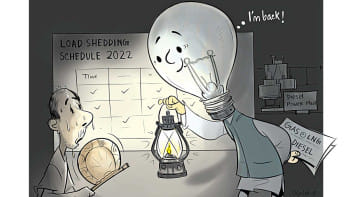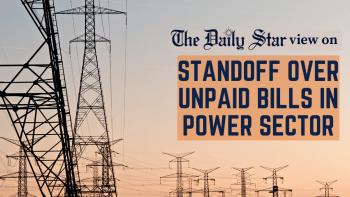Area discrimination unacceptable during loadshedding

How are people supposed to live and do their daily work with electricity going out every alternate hour? That is exactly what the people of 21 Dhaka neighbourhoods are having to experience. According to a report by this newspaper from Wednesday, people living in the capital's Shyampur, Nandalalpur, Kajla and Matuail areas experienced load-shedding every alternate hour on Tuesday. And if that wasn't bad enough, they had to endure four hours of load-shedding between midnight and 8am, making it impossible for them to get any proper sleep.
Because of this grave situation, families are having to spend their nights crammed into one room with a single rechargeable table fan. Young mothers are having to spend their nights fanning their babies by hand. And all these are happening at a time when temperatures are going up to 34 degrees Celsius during the day.
Businesses are also suffering huge losses due to the regular power outages. Customers have been reluctant to visit markets when there is load-shedding. Production is being hampered tremendously, as many factories and industries rely on electricity for their production. And even though they have generators as backup, power outages are occurring so frequently that even the generators are failing to provide enough backup, leading to lost work hours.
Even though there is no denying that global factors have had a big impact on our power sector, the fact remains that corruption and mismanagement are also responsible for its poor state. And it is a grave injustice that the government, instead of taking action against those responsible for such corruption and mismanagement, is making the people pay via frequent power cuts. And that, in turn, is damaging the national economy even further – as well as causing huge sufferings for ordinary people.
Had the government paid proper heed to the past warnings of the experts, and taken appropriate measures, it is quite possible that we would not be in this terrible shape that we are in now. Be that as it may, even the experts have said that there is still time for the government to turn things around. However, for that, the government must now be open to taking advice from experts, and be willing to conduct its activities far more transparently, as well as hold the concerned authorities who were involved with all the irregularities in the sector to account.
In the meanwhile, since right now there is no way for us to avoid load-shedding, we hope that the authorities will be far more conscious and thoughtful about how to conduct it. Load-shedding should be equally divided amongst different areas – none should get preference over others, unless they have a higher volume of schools, hospitals, and other emergency service provers. And power cuts should be avoided as much as possible at night, so that people can get some proper sleep.

 For all latest news, follow The Daily Star's Google News channel.
For all latest news, follow The Daily Star's Google News channel. 









Comments